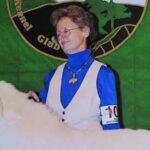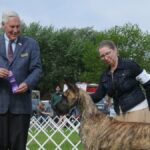The opportunities for obtaining AKC titles in a variety of ways seem to be expanding regularly. The evolution of the sport in Conformation, Obedience, Agility, Field Trials, and a host of other types of competition now offers dog enthusiasts an unlimited number of events in which to compete and earn those coveted titles and designations.
On any given day or weekend, the number of events being held across the country offers the exhibitors countless opportunities within a few hours’ drive of most Americans’ homes. Some of these are just one or two days on a weekend while others are part of clusters that provide as many as five days of competition at one given site.
With the growth of these events, there is also an increase in the number of first-time exhibitors in the various forms of competition. These newcomers to our family are the focus of this article.
The Beginning
In most cases, these “newbies” have obtained their puppy from a variety of sources. The lucky ones have obtained high-quality animals from reputable breeders who will provide them with continued mentoring as they make their way into the competition arena. Others will have obtained their puppies, or in some cases, older dogs, from newspaper ads, Internet searches, friends, commercial breeders, and many other sources.
Many of these individuals have been drawn into the sport by seeing Westminster, the AKC National Championship, and several other AKC Conformation shows on TV. This group is attracted to the Conformation ring. At the same time, the exposure to the number of Performance and Field Events found on the TV screen has pulled many into the diversified opportunities available in those venues.
Getting Started
Once these individuals find their areas of interest, many will start to search for more information as well as sources to start their journey.
Some will find a local kennel club and will attend a meeting or two. Depending upon the club, they may or may not start a learning process to prepare them for competition. Some clubs only focus on Conformation, others strictly on Performance. Many clubs, just like my club, the Tennessee Valley Kennel Club, have developed and encouraged diversity in their membership to include dog lovers regardless of their area of interest.
Kennel Clubs have a responsibility to assist and encourage these new people so that they can become not only an asset to the club but also a successful member of our dog family.
Some clubs offer Conformation training classes, the AKC Puppy Star Program, as well as Obedience and introductions to other forms of competition. These classes are truly a wonderful way for the newbie to learn in a relaxed atmosphere, to not only prepare them for competition but also allow them to meet and make friends with others who are willing to share their expertise while also offering encouragement and support going forward.
Kennel Clubs have a responsibility to assist and encourage these new people so that they can become not only an asset to the club but also a successful member of our dog family.
Real Competition
When the newbie has made an entry into a show or trial, this is where our village of support is needed the most.
Think back to the first time you showed up ringside for the first time. Were you prepared? Did you know how to get your armband, find your ring, follow the judging program, know how to stack and present your dog? Did you have the proper lead?
If you were one of the fortunate ones who had a mentor or had found a kennel club or a training class to prepare you, other than being a little nervous you were excited and ready. On the other hand, if you were one of those who just blindly entered, you were probably overwhelmed by the experience.
It is safe to say that at pretty much every show or event, someone there is a newbie and it is their first show. Seasoned exhibitors, handlers, and judges can often tell that this person is a rookie.
It is here where we all have a responsibility to help and encourage these people. Do you walk over to the new person and introduce yourself and try to make them feel welcome? If you notice that they may have the wrong lead or collar, do you offer to help them? Or are you one of those people who is grateful for their entry because it helps the point scale for you?
If you are the judge, you have a responsibility to be patient with the newcomer. Some exhibitors will tell you that it is their first show. Many are just nervous, so a kind word and some tips will help them get through the process. At the same time, in most cases, it is also the first real competition for the dog, and they may also be nervous, a little timid, or shy. As the judge, your demeanor in these cases may be the reason they continue or simply quit and give up because of a bad experience.
Quality and Preparation
Getting ready for competition and getting into the ring are very important. On the other side of the coin is the evaluation and preparation for the ring. These are also major areas in which we all share a responsibility.
On the Performance Side
In most cases in the Performance Events, the quality and grooming of the exhibit is not as important as the training and the dog’s ability to compete and complete the task at hand. In these cases, again, just being kind, helpful, and encouraging will be greatly appreciated by the new exhibitor. After they compete, no matter if they were successful or not in their performance, make them feel welcome, and if needed, offer them advice or possibly guidance to encourage them to prepare for future events.
In most cases in the Performance Events, the quality and grooming of the exhibit is not as important as the training and the dog’s ability to compete and complete the task at hand.
The Conformation Events
As we all know, the majority of complaints come from the Conformation exhibitors. In many of these complaints, the judges are the target, and at times the complaints can be brutal. Many newer exhibitors may have been told by their breeder or someone else that their dog is excellent, real show quality, and should finish easily.
Ask anyone who has ever exhibited if they have ever seen a dog that has never lost. We all know multiple things enter into success or failure in the show ring. First is the judge. It is their ring and their job to sort through the exhibits placed in front of them on that day and select those that, in their opinion, best represent the Standard for the breed. Next, there is the quality of the competition on that day and how well they are presented in the ring. The size of the ring, and if the show is indoors or outdoors, can also affect that day’s outcome.
At the same time, it should be noted that judges can only choose from what is placed in front of them that day. In most cases, there are exhibits in the ring that are deserving of championship points and they are awarded. In some rarer instances, judges are faced with the dilemma of withholding Winners or Reserve or other awards because, in their opinion, the exhibits are not deserving of championship points on that day,
When withholding, judges will usually (and hopefully with grace and empathy) explain why they are not awarding those exhibits on the day. I can tell you that this can be difficult for the judge, and when I have had to do it I’ve tried to explain my reasoning to the exhibitor. If, in my opinion, it is obvious that the dog probably will not improve, I encourage them to seek out reputable breeders in that particular breed to further evaluate the dog. I also tell them there are many other types of competition available to compete in if they wish or as something to do with the dog while they search for a true show specimen to exhibit in the future.
In many cases, we as judges see numerous specimens that probably should not be shown, but we have large enough classes that we award the points and breeds but don’t have the time or the opportunity to speak with those individuals at the time.
I recently judged a particular breed at a show where I had sufficient exhibits to give all of the awards to deserving dogs. However, in the course of my judging this breed, one particular exhibitor presented me with three exhibits that were undoubtedly the breed being judged, but their quality was extremely poor. Not having time at that moment to speak with the exhibitor, I continued with my judging.
Later, while taking a photograph with one of that breed’s winners, I asked an exhibitor if anyone had taken the time to introduce themselves to the other exhibitor and possibly share a copy of the breed’s Illustrated Standard, which would be an excellent way to help the other exhibitor understand why they were losing. I said to this exhibitor that the other lady had entered three dogs for four days (so that was at least $400 in entries, plus her expenses), so she was definitely interested in showing.
I asked why no one had spoken to her and offer to help her acquire a show specimen by simply putting those monies toward a quality dog. She could continue with just one if she wanted to gain experience, but she was wasting her money and would most likely become discouraged and would probably walk away and never return to the show ring.
In instances like this one, it is our responsibility to our sport—but especially to our breeds—to help these people so that they can succeed. Think about it. What if this person breeds any one of those three specimens… will she be helping or hurting the breed? Does she know about health testing? Does she understand the building blocks of successful breeding? If no one helps her, she will probably have future litters of the same quality, which is not improving the breed at all.
In Closing
We are all a part of this great family of dog lovers and competition enthusiasts. I hope we can all make it a part of our mission that whenever there’s an opportunity to assist a newcomer (or any other member of our dog family) with help and support, we will do it. Don’t be afraid to help someone because you fear that helping them may cause you a loss in the future. Giving your time, talent, and experience is just a way to pay it forward to ensure the success of our sport for the next generation and beyond. The added plus is how good you will feel for helping another in their quest for success.









